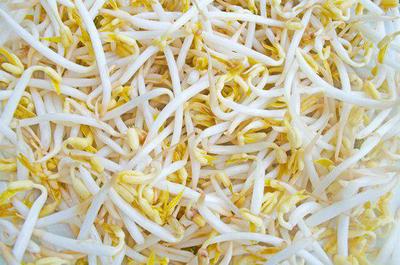🌱 Can Dogs Eat Bean Sprouts
We dive into the topic of bean sprouts, how many should you give your dog?
 A delicious dish of bean sprouts
A delicious dish of bean sprouts
Dog Eat Guide Summary
What are the benefits of eating beans for your dog?
Beans have been used for centuries as food in many cultures around the world. In fact, they were one of the first crops grown by humans. Today, we still use beans as part of our diets because they provide us with nutrients like iron, zinc, potassium, magnesium, phosphorus, copper, manganese, vitamin B6, folate, niacin, pantothenic acid, riboflavin, thiamine, biotin, choline, lysine, methionine, tryptophan, selenium, calcium, phosphorous, sodium, chlorine, iodine, and more.
These vitamins and minerals can all benefit your dog 🐕 when he eats beans or bean products. Some studies even show that consuming beans may reduce the risk of certain types of cancer and heart disease such as colon cancer. This makes it an excellent choice for your pup.
How much should my pet be consuming each day?
The amount of beans your dog needs depends on his size and activity level. A small breed puppy might only require 1/2 cup per day while larger breeds could consume up to 2 cups each day. If your dog has special dietary requirements, consult your veterinarian about how much he should be getting from this particular food product.

Is it safe to feed them raw?
Raw beans and cooked beans both offer benefits to your dog but raw ones do not always taste good so cooking them is recommended. Cooking 👨🍳 removes harmful bacteria found naturally in uncooked beans and bean sprouts. When choosing canned beans, make sure to read the label carefully since some brands add preservatives and other additives. Also, avoid feeding your dog too many different kinds of beans at once. Too much variety can cause digestive problems and stomach upsets. Instead, feed him/her just one kind every few days until they are accustomed to it.
Are there any side effects?
There are no known side effects associated with giving your dog beans or bean sprouts. As long as you follow proper guidelines, you shouldn’t experience any issues either. Just remember to give your dog plenty of water throughout the day and monitor his stool regularly. If you notice anything unusual, contact your vet immediately.
Can I use pre-cooked products?
You don’t necessarily have to cook whole beans yourself. Many people choose to buy pre-cooked varieties instead. While these options aren’t quite as nutritious as fresh beans, they are convenient and easy to prepare. Make sure to check labels though to ensure that the manufacturers haven’t added extra ingredients.
Should I add other vegetables like broccoli 🥦 & spinach?
Yes! Both broccoli and spinach are very beneficial additions to your dog’s diet. Not only does broccoli contain high levels of antioxidants, it contains folic acid, vitamin C, beta carotene, and several other important nutrients. Spinach also provides a number of health benefits including fiber, protein, and essential amino acids. You can easily include these vegetables into your pet’s daily meals by adding them to their kibble or serving them separately.
What about soybeans?
Soybeans are another great option if you want to introduce your dog to new foods. However, soybean allergies are common among pets so it’s best to start slowly and gradually increase its intake over time. Start out by offering half a teaspoon of ground soybeans mixed into your dog’s regular meal twice a week. Once he seems comfortable eating it, move on to full servings three times a week. Mung beans are an excellent source of iron for puppies who need more than what their mother gives them during pregnancy. Mung beans are available dried or frozen. The latter will keep longer without spoiling.
Which root vegetables 🥕 are good?
Root vegetables such as carrots, beets, turnips, parsnip, radishes, rutabaga, sweet potatoes, yams, etc., are all safe for dogs to consume. These root veggies provide vitamins A, B6, C, D, E, K, calcium, phosphorus, magnesium and iron.
Some of these minerals may help prevent certain diseases like cancer, arthritis, kidney stones, heart disease, diabetes, obesity, skin disorders, liver damage, and even aging. Root vegetables are rich sources of dietary fiber which helps maintain healthy digestion and elimination systems.
The fiber from these veggies aids in weight loss, reduces cholesterol, lowers blood pressure, prevents constipation, promotes normal bowel movements, and improves overall well being.